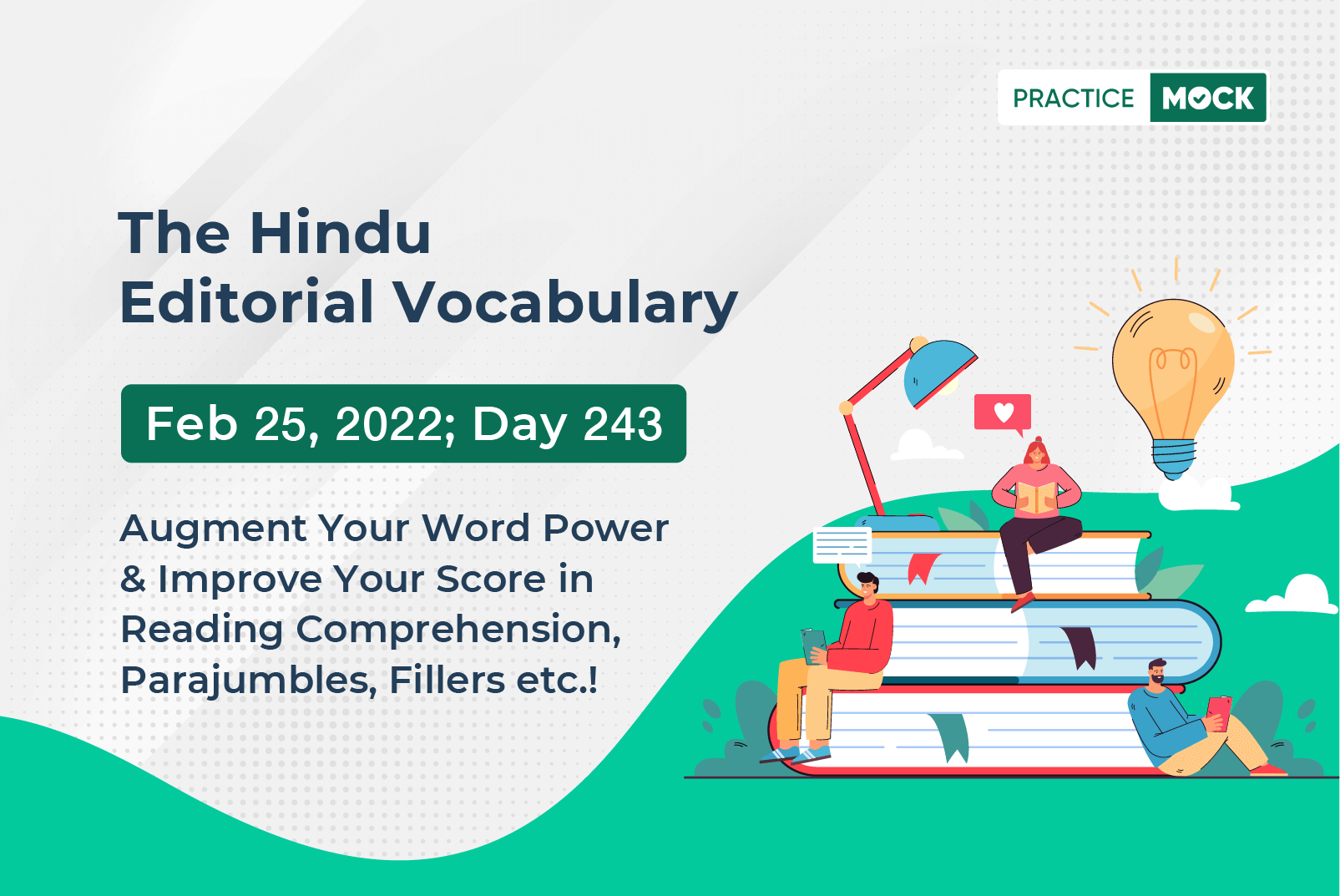| Difficult Word/ Phrase | Contextual Sense |
| Incursion | The act of entering some territory or domain (often in large numbers) |
| Build-up | a slow increase in something |
| Ripple effect | The effect of an event setting off other events in an unexpected way, or in unexpected areas |
| Invasion | the act of entering a place in large numbers especially in a way that is harmful or unwanted |
| Overlay | lie on top of |
| Cut off | cease |
| Backlash | An adverse reaction to some political or social occurrence |
| Intractability | The trait of being hard to influence or control |
| Palpable | Clearly revealed to the mind or the senses or judgment |
| Devastating | Wreaking or capable of wreaking complete destruction |

Russia’s NATO problem: On the Ukraine war
Putin seems unwilling to engage diplomatically to address Russian security concerns
Russia’s unjustifiable incursion (The act of entering some territory or domain (often in large numbers)) into Ukraine following weeks of military troop build-up (a slow increase in something) on their shared border has drastically raised tensions in the region with broader ripple effects (The effect of an event setting off other events in an unexpected way, or in unexpected areas) across the world, particularly for NATO countries and others with strategic connections to the two nations. Reports said that several Ukrainian cities, including capital Kyiv came under attack on Thursday morning, even as the UN Security Council held an emergency meeting to stop the invasion (the act of entering a place in large numbers especially in a way that is harmful or unwanted). U.S. President Joe Biden and the NATO and European Commission leadership vowed to impose “severe sanctions” on Russia. This round of sanctions will overlay (lie on top of) prior economic penalties imposed on Russian entities and individuals close to the political leadership, and they are expected to include cutting off (cease) top Russian banks from the financial system, halting technology exports, and directly targeting the Russian President. Moscow can hardly be surprised at this backlash (An adverse reaction to some political or social occurrence), for it has shown little sympathy toward the idea of engaging diplomatically on the Ukraine question to address Russian security concerns. Ever since Russia began amassing troops on the Ukrainian border, the U.S., NATO, and Europe have sought to press for diplomatic solutions. This includes direct U.S.-Russia negotiations, and French President Macron’s meeting with Mr. Putin.
While the sense of frustration in western capitals over Mr. Putin’s intractability (The trait of being hard to influence or control) and aggression are palpable (Clearly revealed to the mind or the senses or judgment), and the use of severe sanctions stemming from that is a strategic inevitability, it is unlikely that the prospect of escalating violence and a devastating (Wreaking or capable of wreaking complete destruction) toll on human life and property in Ukraine can be ruled out until Mr. Putin’s broader questions on NATO are answered. At the heart of his fears is the prospect of Ukraine joining NATO and NATO troops potentially stationed at the border with Russia. NATO’s historical record, of its penchant for expansionism, has likely fuelled such insecurities. After the dissolution of the former Soviet Union, the Eastern European military alliance, NATO, and Russia in 1997 signed the “Founding Act” on mutual relations, cooperation, and security. Disregarding the spirit of this agreement, NATO quietly underwent five rounds of enlargement during the 1990s, pulling former Soviet Union countries into its orbit. Cooperative exchanges, communications hotlines, and Cold War fail-safes such as arms control verification have fallen by the wayside, even more since Russia’s annexation of Crimea in 2014. It may be the case that owing to Mr. Putin’s failure to develop Russia into an economic powerhouse that naturally attracted neighbouring countries and international capital to itself partly explains Moscow’s deflection of attention to strategic questions relating to NATO and Russia’s territorial integrity. But unless western nations give assurances to Mr. Putin that NATO will not seek to relentlessly expand its footprint eastwards, Moscow will have little incentive to return to the negotiating table. But Russia and Mr. Putin must realise that war is not the means to peace and security.

Want to improve your vocabulary further? Download the Lists of Word-Meanings of Previous Months here.
- Sign Up on Practicemock for Updated Current Affairs, Free Topic Tests and Free Mini Mocks
- Sign Up Here to Download Free Study Material
Free Mock Tests for the Upcoming Exams
- RRB PO 2024 Free Mock Test
- RRB Clerk 2024 Free Mock Test
- SSC MTS Free Mock Test
- SSC CHSL Free Mock Test
- SSC CGL Free Mock Test
- GATE Mechanical Free Mock Test
- GATE Civil Free Mock Test
- NABARD Gr. A Free Mock Test
- SBI Clerk Mains Free Mock Test
- SSC CPO Free Mock Test
- AFCAT Free Mock Test
- CAT Free Mock Test
- NIACL Assistant Free Mock Test
- UIIC AO Free Mock Test
- UIIC Assistant Free Mock Test
- GIC Assistant Manager Free Mock Test
- NICL AO Free Mock Test
- Free SSC Live Test
- UPSC CSAT Free Mock Test
- CDS-I Free Mock Test
- RRB ALP Free Mock Test


